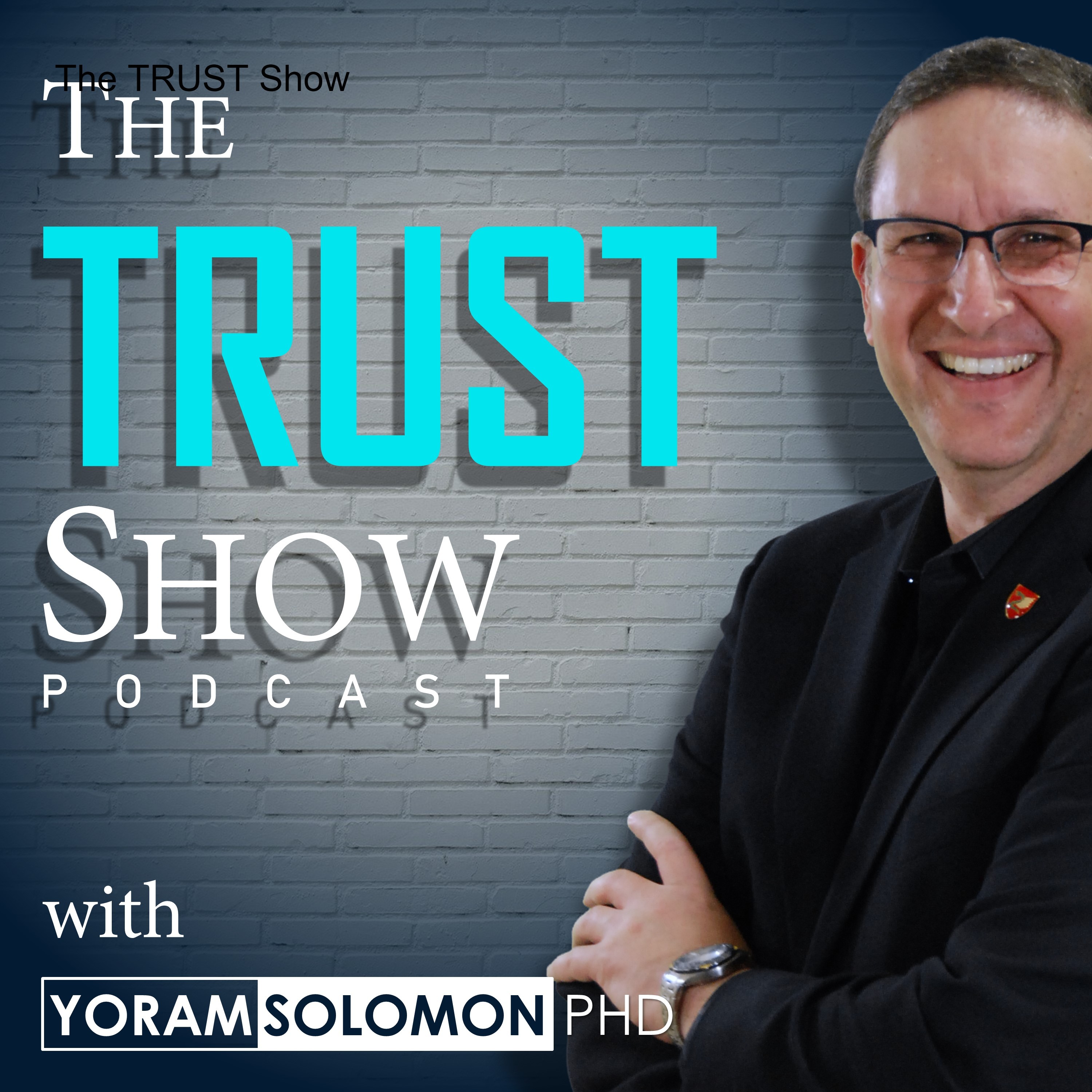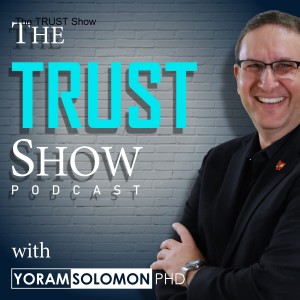
17.3K
Downloads
195
Episodes
Trust is not what you think it is. It is not absolute or universal. Trust is relative. The same behavior that would cause one person to trust you could cause another person to distrust you. The level of trust someone has in you is the product of their trustfulness (their willingness to trust other people) and your trustworthiness. There is almost (I said ALMOST) nothing you can do about the former, and everything you can do about the latter. Because of that, you must evaluate your own trustworthiness one relationship at a time, separately. Odds are, though, that the same behaviors that are holding you back from being more trusted in one relationship are holding you back from being more trusted in other relationships. Welcome to The Trust Show. I’m your host, Yoram Solomon, a top 10 trust expert and researcher, the author of the book of trust, and the creator of the Trust Habits® workshop that helps people and organizations form new habits that change old behaviors, build trust, and transform organizations. In this educational podcast, I will challenge you to think differently about trust, through the 8 laws of trust and the 6 components of trustworthiness. I will share my own stories, experiences of others, trust research, and sometimes, reflect on a news item. And through those, I will show you how to build trust, be trusted, and know who to trust. Because the answer to this question will have the biggest impact on your personal and professional, success or failure: can you be trusted?
Trust is not what you think it is. It is not absolute or universal. Trust is relative. The same behavior that would cause one person to trust you could cause another person to distrust you. The level of trust someone has in you is the product of their trustfulness (their willingness to trust other people) and your trustworthiness. There is almost (I said ALMOST) nothing you can do about the former, and everything you can do about the latter. Because of that, you must evaluate your own trustworthiness one relationship at a time, separately. Odds are, though, that the same behaviors that are holding you back from being more trusted in one relationship are holding you back from being more trusted in other relationships. Welcome to The Trust Show. I’m your host, Yoram Solomon, a top 10 trust expert and researcher, the author of the book of trust, and the creator of the Trust Habits® workshop that helps people and organizations form new habits that change old behaviors, build trust, and transform organizations. In this educational podcast, I will challenge you to think differently about trust, through the 8 laws of trust and the 6 components of trustworthiness. I will share my own stories, experiences of others, trust research, and sometimes, reflect on a news item. And through those, I will show you how to build trust, be trusted, and know who to trust. Because the answer to this question will have the biggest impact on your personal and professional, success or failure: can you be trusted?
Episodes

Sunday Nov 07, 2021
S3E5: Becoming more Trusted, Steps 3/4: SMART Action Plan
Sunday Nov 07, 2021
Sunday Nov 07, 2021

Sunday Oct 31, 2021
S3E4: Becoming more Trusted, Step 2: One BAD Thing
Sunday Oct 31, 2021
Sunday Oct 31, 2021
This is the second episode in which I’m taking you through the 7 step process to be more trusted. In the previous episode, you went through step 1 and identified one relationship you want to be more trusted at. In this episode, you will go through step 2, and identify one bad thing you are doing in that relationship that is holding you back from being more trusted.

Sunday Oct 24, 2021
S3E3: Becoming More Trusted. Step 1: One Relationship
Sunday Oct 24, 2021
Sunday Oct 24, 2021
In previous seasons and episodes you learned what trust is, the benefits of it, the costs of not having trust. You learned the 8 laws of trust, and that the building block of trust is your trustworthiness. Then, you learned my 6 component model of what makes a person trustworthy. I even applied it to different situations. Now, it’s time to work on your trustworthiness, using my 7-step process. To some extent, it is similar to losing weight. There are strong benefits, but it’s really hard to do, although not impossible. This is the first episode in a series of episodes that will take you through that process. If up until now I educated you, now it’s time to make it happen. I will give you examples from my weight loss journey, as well as the process I took myself through to become a better leader. I will give you specific assignments. The best way to benefit from this is to actually do the assignments. You can follow the process here in this podcast, or in The Book of TRUST, The WORKBOOK of TRUST, or my online courses TRUSTED at WORK.

Sunday Oct 17, 2021
S3E2: How to Kill Trustworthiness
Sunday Oct 17, 2021
Sunday Oct 17, 2021
No leader intentionally wants to kill trustworthiness of their people. But they do it anyway, and often for what they believe are justified reasons. Nevertheless, the outcome is the same: they cause their people to lose their trustworthiness, and as a result, they can’t trust them. This episode will explain WHY it happens in light of the 8 laws of trust and the 6 components of trustworthiness which were covered in seasons one and two of this podcast, but also give you tools, using those same 8 laws and 6 components, to stop killing their trustworthiness and increase the level of trust in the organization.

Sunday Oct 10, 2021
S3E1: The Cost of Not Having Enough Trust
Sunday Oct 10, 2021
Sunday Oct 10, 2021
Why is trust so important? How does trust contribute to the bottom line? This episode cites a lot of research done by many. It shows the impact of having trust on company performance, on employee attitudes, on employee behaviors, and on project performance. A lot of numbers will be thrown in this episode, that will paint a complete picture. They will show what happens when the level of trust is above average, as well as what happens when it dips below average. It will also explain why being trusted is so important to us. All the sources of the data provided in this episode are listed in The Book of Trust.

Sunday Oct 03, 2021
S2E10: (Not a) Great Job! Participation Trophies, and Trust
Sunday Oct 03, 2021
Sunday Oct 03, 2021
There are two words that are probably responsible for launching more failed businesses than any other two words in the English language, and possibly in history: Great Job! This episode is more of an opinion, and it’s an opinion about one of my biggest pet peeves, and it is linked directly to trust, the lack of trust, the decline in trustworthiness, and the decline of excellence and exceptionalism. I will be using my trust model to explain why we do it, what are the consequences of it, and how to stop it.

Sunday Sep 26, 2021
S2E9: There is More Than One Way to be a Trusted Brand
Sunday Sep 26, 2021
Sunday Sep 26, 2021
We are bombarded with tv and radio commercials telling us the certain brands are TRUSTED. I always cringe when I hear that. Are they really trusted? Are they worthy of your trust? Says who? This episode will not teach you a new trust law, or a new component of trust, but rather apply those to the trustworthiness of a brand. What you will find in this episode is that there is no one way to be trusted as a brand, and a few mistakes that brands make in their attempt to be trusted, and how to avoid those mistakes.
![S2E8: What Makes You Trusted? The NEW Trust-6 Model: Time & Intimacy [Part 2]](https://pbcdn1.podbean.com/imglogo/image-logo/11992684/TTS_New_fqieyv_300x300.jpg)
Sunday Sep 19, 2021
Sunday Sep 19, 2021
This is the second part (of 2) to cover the two components that accelerate the impact that positivity has on building trust: time and intimacy. Time is the frequency and length of interactions, and intimacy is the level of communication, and ranges from words-only text and email messages to in-person, face-to-face communications, and even more. In this episode, we focus on the consistency of verbal and non-verbal communications, and the link between that consistency and trust. This episode also covers additional elements such as things beyond face-to-face communications, the body language of email, how trust can be built even through one-way communications, and more.
![S2E7: What Makes You Trusted? The NEW Trust-6 Model: Time & Intimacy [Part 1]](https://pbcdn1.podbean.com/imglogo/image-logo/11992684/TTS_New_fqieyv_300x300.jpg)
Sunday Sep 12, 2021
Sunday Sep 12, 2021
The previous episode covered the positivity component of “what you do”. Your positivity sets the direction to whether you build trust or reduce trust during an interaction. This episode is the first part (of two) covering the two components that accelerate the impact that positivity has on building trust: time and intimacy. Time is the frequency and length of interactions, and intimacy is the level of communication, and ranges from words-only text and email messages to in-person, face-to-face communications, and even more.

Sunday Sep 05, 2021
S2E6: What Makes You Trusted? The NEW Trust-6 Model: Positivity
Sunday Sep 05, 2021
Sunday Sep 05, 2021
The first five episodes of the second season described the three components of the “who you are” group of components of my trustworthiness model: competence, personality compatibility, and symmetry. This episode begins covering the components of the “what you do” during an interaction that will allow you to have an immediate impact on your trustworthiness by the end of the interaction. There are three components in this group: positivity, time, and intimacy. This episode goes into the details of the positivity component and the two sub-components it has: the level of BS you bring into the interaction, and the level of your self-centered behavior. These will be multiplied, and accelerated by time an intimacy, which will be described in later episodes.
